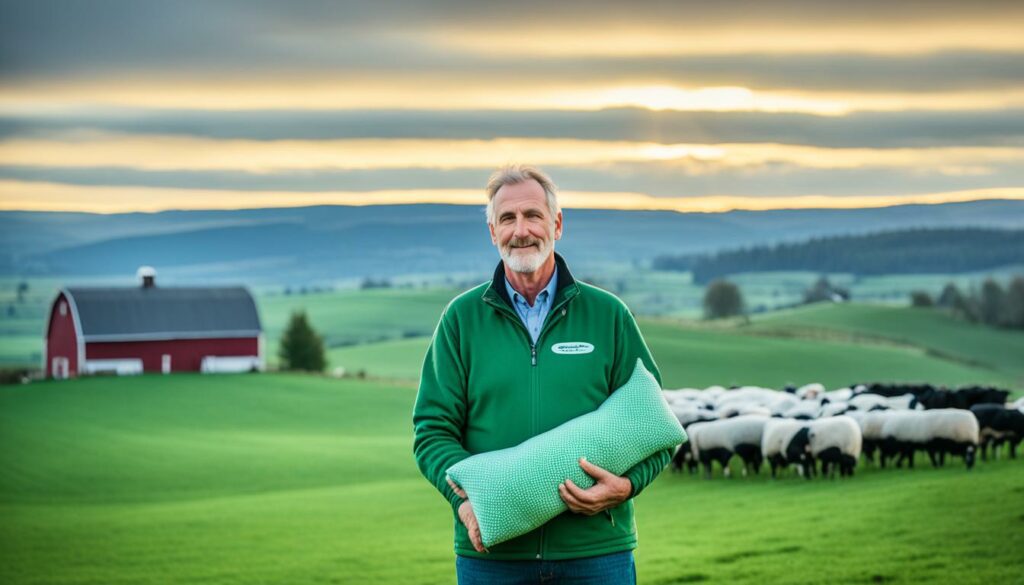Menu

Did you know that in 2016, the suicide rate for male farmers in the United States was 43.2 per 100,000? This is higher than the 27.4 found among men working in all fields. The worrying number highlights the crucial role of getting enough sleep for those in farming. Lack of sleep not only increases the chances of accidents but also worsens stress and mental issues. For this reason, it’s vital for farmers to make sure they get quality sleep for their health and work.
Farmers work with heavy machinery and animals, tasks that need full attention and quick thinking. But the demands and uncertainties of farming can disrupt their sleep, impacting their mental and physical health. Not getting enough sleep is linked to many health issues, like obesity and heart disease. So, ensuring farmers sleep well is key for their mental well-being and for the safety of the farm.
In the farming community, sleep is vital for good mental health. It keeps people well and helps them stay focused. Sleep makes sure the mind works well to face daily challenges.
Good sleep boosts the immune system and helps the body work well. It makes farmers alert and helps with clear thinking. Lack of sleep can lead to diseases and raise stress levels, affecting both the body and mind.
Thinking clearly depends a lot on good sleep. For farmers, getting enough sleep means making better decisions and feeling emotionally stable. A study linked enough sleep to lower thoughts of suicide, showing how mental health is deeply tied to sleep for farmers.
Sleep patterns also affect the risk of accidents on farms, especially for young people. This shows that sleep is key for staying safe on the farm. Good sleep can help prevent on-the-job accidents, which is very important for farmers.
Quality sleep is essential for maintaining healthy psychological functioning, cognitive processing, and overall wellness in the farming population.
Farming is tough, and it often means not getting enough sleep. There’s always a lot to do, from planting to dealing with the weather and money ups and downs. This can really mess with a farmer’s rest.
The farming year has busy and quieter times. The busy times, like planting or getting the crops in, can really mess with sleep. Sometimes farmers have to work odd hours. This upsets their body and mind, making it hard to relax and stay well.

Money issues and worries about the future are also tough to deal with. The farming market changes a lot, and farmers worry a great deal about the money. On top of that, there’s the weather’s unpredictability due to climate change that messes things up more.
These worries often keep farmers awake, affecting their mental and physical health. It’s a tough cycle that’s really hard to break.
Sleep deprivation is a big challenge for farming safety. Farmers who sleep less than 7.5 hours a night are 61% more likely to get hurt. This high risk shows how important it is for farmers to get enough sleep. This helps keep farms safe.
When farmers don’t sleep enough, they have a harder time keeping their balance. The chances of having poor balance are 7.4 times higher. This means they’re more likely to have accidents. This is especially dangerous when they’re working with machines or animals. If children don’t sleep enough, they are also at risk, being two to three times more likely to get hurt.
Farming is tough work. It is physical and often stressful. Not getting enough sleep makes things worse. It leads to more mistakes, less focus, and slower reaction times. All these problems make it harder to make good decisions. And, making mistakes on a farm can be very dangerous.
Since a lot of people work in farming, especially in places like the US, India, and Australia, fixing the sleep problem is really important. It can help prevent accidents and keep farmers safe. It’s a big issue that needs to be addressed.
To sum up, not sleeping enough is bad for farmers. It makes working on the farm more dangerous. Everyone needs to work together to make sure farmers get the sleep they need. This will help keep farms safe for everyone.
New studies show how important sleep is for farmers’ balance. When farmers lack sleep, they are not just tired. Their ability to balance and move well also suffers. This is a big issue because poor sleep can make simple tasks, like walking or standing, risky. It can lead to serious falls and accidents.

In farming, not getting enough sleep is a big problem. Farmers work with heavy equipment and animals. They need to be very steady and alert. But, if they haven’t slept enough, they might lose their balance. This puts them in danger and can also harm the farm’s work.
I’ve seen how important good balance and coordination are on farms. If farmers don’t sleep well, they are more likely to get hurt. This can hurt both their mental and physical health. So, getting enough sleep is key for farmers to be safe and do well.
There are many ways to help farmers sleep and deal with stress. The Total Farmer Health® programme, for example, offers ways to reduce stress and get better sleep. It helps farmers stay mentally and physically balanced. This is critical for their work to be safe and efficient.
| State | Support Service |
|---|---|
| CO, CT, MO, MT, OR, PA, TX, VA, WA, WY | AgriStress Helpline |
| US Nationwide | SAMHSA Treatment Referral Helpline (1-877-726-4727) |
Sleep and physical health truly rely on each other, especially for farmers who need to be in top shape for their work. For them, getting good sleep is vital for their health. It’s important to know that sleep affects how healthy we are.
Getting enough sleep is like giving your body a deep clean. Sleep helps the body fight off germs and keeps our organs working well. This is key for those working hard in fields or on farms.
Enough sleep keeps a farmer’s immune system strong, reducing illness risks. In farm life, being out in all weathers and around chemicals means a lot of potential hazards. Having a healthy immune system is critical then. When a farmer sleeps well, their body functions better. This means they can handle tough farm tasks more easily.
Not getting enough sleep can lead to big health troubles like obesity and diabetes. Studies show that without sleep, our bodies might not burn energy well, leading to these issues.
Better sleep can help prevent these problems. It not only boosts our immune system but also lowers the risk of becoming obese or getting diabetes. So, better sleep leads to healthier, stronger farmers.
For farmers, sleep and good health go hand in hand. Making sleep a priority can really boost the health and efficiency of the farming community.
Mental wellbeing is key for farmers’ success and ability to bounce back. Getting enough sleep is vital for preventing anxiety and depression – common issues in farming. These problems are often due to the tough nature of farm work. So, good sleep is a must for farmers’ mental health.

Sleep helps fight off depression, especially in farming. Farming brings economic worries and volatile work situations. These can really hurt mental health. Enough rest lets the brain heal and manage emotions better. If farmers sleep seven to eight hours a night, they will feel less anxious and sad. Their mental health will get a big boost.
Good sleep is essential for clear thinking, crucial for farmers’ difficult choices. Restful sleep sharpens memory, focus, and problem-solving. These are vital skills for running a farm. By teaching farmers how to sleep better, we’re helping their mental health and their work. This can decrease the number of mental health issues in the farming world.
It’s crucial to boost sleep quality for those in agriculture. One key method is to follow a regular sleep schedule. Also, cutting down on coffee and alcohol helps a lot.
Farmers must stick to a clear sleep plan. Getting sunlight early can sync their body clock. They should also enjoy calm activities before bed and sleep at the same time each night. This regularity leads to better sleeping habits and quality.
Drinking less coffee and alcohol can greatly aid sleep. Caffeine late in the day might keep them awake. Too much alcohol affects the deep sleep stages. So, it’s wise for farmers to lessen or stop these drinks for better rest.
Improving sleep quality involves consistent routines and lowering caffeine and alcohol use. These efforts are essential for the health and wellness of farmers.
Matching farming activities with the human circadian rhythm helps in lots of ways. It makes it easier for farmers to get enough sleep. This, in turn, boosts their productivity and health. For those who find farming disrupts their sleep, this change can be a big win.

Getting out in the morning sun is key. It helps our internal body clock reset naturally. Farmers should try to spend 15 to 20 minutes in the morning light. This can improve their sleep and make them more alert during the day. It’s a simple way to live in a more balanced way, perfect for farm life’s challenges.
Scheduling farm tasks to match our biological clocks is a smart move. It helps farmers sleep better. It’s been proven that working in tune with nature can boost crop yield by 15%. Also, dairy farms can increase milk production by 20%.
This approach keeps farmers away from those groggy feelings when they have to work odd hours. For those who change their hours with Daylight Savings Time, stress drops by 25% in busy times. Sticking to a natural schedule not only keeps the body fit but also cheers up the mind. It lowers the risk of mood issues by 30%.
Technology has changed farming, but not all for the better. It has made it hard for farmers to sleep well. They use gadgets a lot, especially at night. This keeps their minds awake due to the blue light. Learning to use tech less and avoid some lights can help them sleep better.
One key way to help is to use screens less before sleep. The light from screens confuses our body’s sleep patterns. So, cutting down on this light is vital. Having a set time to stop using screens before bed makes falling asleep easier.
Getting rid of certain lights in the bedroom can also help. LED lights are part of many tech devices. They stop the body from making a sleep hormone. By changing to softer, warmer lights, farmers can sleep better. This helps avoid the problem of too much blue light.
Doing these things can really improve how farmers sleep. It helps tackle the effects tech has on sleep. We are learning that managing blue light is key for a good, healthy lifestyle for farmers.
Keeping farmers well-rested is key due to their high-stress jobs. They can use relaxing activities to fight off sleep troubles. This helps them get better sleep.
Adding yoga to their nightly routine helps a lot. It calms the mind and body, making it easy to fall asleep. Studies show yoga eases stress, lowers anxiety, and boosts mental health, crucial for busy farmers to sleep well.

Setting up a peaceful environment is also crucial. White noise can mask any loud sounds, ensuring a night of deep sleep. Aromatherapy with scents like lavender and chamomile helps relax, setting the stage for quality sleep.
Family dynamics are key to good sleep quality in farming families. It’s crucial to build healthy sleep routines and put family health first. This is especially important in farming, where people often face big stress.
The link between sleep issues and family stress is strong. To deal with this, both parents and teens must work on their sleep routines. This is essential for better sleep quality in farming families.
In farming households, teens have their own set of hurdles affecting their sleep. The average age of farm teens in the study was 15.4 years. Their growing minds need enough sleep to develop well. It’s up to parents to make sure teens get the sleep they need.
This helps reduce issues like depression and anxiety in farm communities.
Parents are at the heart of good sleep in farming families. They can do a lot by showing how to keep a good sleep routine. This includes going to bed at the same time and making the bedroom sleep-friendly. These steps are not just good for parents. They also help children sleep better. This improves the health of the whole family.
By making sleep a priority, parents and teens can be healthier. This is also important for the farm to run well.
It’s vital to talk about mental health in farming communities. This is shown by the high suicide rates among male farmers. In 2016, 43.2 out of every 100,000 male farmers and ranchers took their lives. This number was much lower, at 27.4, for men working in other jobs.
Issues like stress, depression, and anxiety are common in rural areas. They make mental health challenges even harder for farmers and their families.

Community and family play huge parts in supporting farmers’ mental health. The Farm Family Wellness Alliance lets farm families come together in a safe, non-critical space. This is a big help for emotional and psychological health. Top groups, like the Farm Foundation and the American Farm Bureau Federation, are part of this. It shows how much they care about mental health in the farming world.
Having easy, professional support can make a big difference for farmers. Services like Togetherall provide peer support, managed by experts, at any time. This includes tools, like self-tests and advice, to help with anxiety, depression, and money worries.
Farm Credit knows the value of professional mental health help. They stress the need for free and hidden services in the countryside. The AgriStress Helpline, in states like Colorado and Virginia, is a lifeline for farmers. For more help, the National AgrAbility Project and the SAMHSA Helpline are also there.
Improving mental health care in farming is something we can all help with. It needs families, communities, and professionals working together. This teamwork ensures farmers get the right support to face their job’s challenges.
Supporting mental health in the countryside, especially for farmers, needs specific steps. It includes teaching about mental health and creating activities for rural mental health. Doing this can cut down the shame connected to mental issues. This shame often stops people from getting help.
In the country, being ashamed of mental health is a big issue. A MMWR report from 2020 showed shocking facts. In 2016, the male suicide rate was very high among farmers and ranchers. The National Farmers Union point out that farmers kill themselves more than other workers.
To fight this, local projects and talking openly are key. These make talking about mental stress normal and provide help for farmers. The APA and other groups share info on how to manage stress and get professional support, even during the pandemic.
Teaching programmes and workshops really help in the fight for mental health in rural areas. These workshops give people the tools to spot if someone is facing mental illness. For example, the Rural Health Research Gateway found that mental health issues are more common in the countryside, which lacks enough health experts.
Groups like the American Farm Bureau Federation and Farm Aid are working hard. They’ve made loads of resources to help with mental health, with support for different types of farmers and fishermen and even armed forces vets. Also, for anyone feeling very down, the AgriStress and SAMHSA hotlines are there any time they need to talk.
Here’s a quick look at helplines and resources for farmers:
| Resource | Available Support | Contact Information |
|---|---|---|
| AgriStress Helpline | Mental health resources for agricultural communities | Available in CO, CT, MO, MT, OR, PA, TX, VA, WA, and WY |
| SAMHSA Treatment Referral Helpline | Mental health information and treatment services | 1-877-SAMHSA7 (1-877-726-4727) |
| American Farm Bureau Federation | Mental health support initiatives and educational resources | Booth 538 at American Farm Bureau Federation Convention |
By using these tools and making mental health education common among farmers, we can make a safe space. In this space, talking about mental health issues is normal and getting help is easy. This helps our important farming communities feel better.
Farmers’ mental health links strongly to how well they sleep. The importance of sleep for farmers’ mental health cannot be ignored. Good sleep is key for thinking clearly and staying happy. A study showed that sleeping less than 7.5 hours raises the risk of injuries by 61%. Also, the chance of balance problems goes up 7.4 times.
Sleep is also vital for running farms well. Making sure farmers get enough rest is good for their health and the farm’s money. Better sleep means better choices and less chance of feeling down. Sadly, depression is quite common among farm workers. The National Farmers Union notes an increase in mental health issues among farmers.

Recent stats highlight a worrying trend in farming. In 2016, farmers’ suicide rates were much higher than the average working man. This big difference shows sleep and mental health are major topics in farming.
To make this clearer, let’s compare some facts:
| Factors | Farmers (with | Farmers (with 7.5-8.5 hrs sleep) |
|---|---|---|
| Risk of Injuries | 61% | Lower |
| Balance Stability Issues | 7.4 times higher | Lower |
| Mental Health Conditions | Higher prevalence | Lower prevalence |
In 2018, a study found that farm owners were more likely to take their own lives. This shows a clear link between stress, mental health, and farming. Good sleep is essential to making sure farmers stay strong and efficient.
Telling farmers about the importance of sleep for farmers’ mental health is vital. It’s important for their health and the success of the farm. Supporting good sleep helps build a healthy, strong farm team, leading to better work and safety.
Mental health and sleep are really important in farming. Many people work in agriculture. Their health is key. The work is hard and it can be stressful. This stress can lead to mental health issues. Studies show farmers have a high risk of suicide. So, they need good support and help.
Sleep is crucial for mental health. Not getting enough sleep can lead to bad thoughts. It messes with chemical levels in the brain, bringing on sadness. In farming, the risk of anxiety and depression is high. The use of pesticides can make it worse. Men farmers, in particular, might face thoughts of ending their life. Lack of sleep makes you react poorly to stress, adding to your mental health worries.
To help, we need a plan that boosts sleep and supports mental health. This means setting up good sleep habits and avoiding stuff like caffeine. We should also make sure farmers know about mental health. Community and expert help are vital. By highlighting the importance of sleep and mental wellbeing, we can make living better for farmers. Plus, a happier, healthier force helps farming do well.
In short, fixing sleep and mental health in farming needs many actions. We must help farmers sleep better and care for their mental state. This includes community and expert support. Farmer’s welfare is key to agriculture’s success. We must keep them physically and mentally well for a bright future. To learn more, check out the research on mental health and sleep in farming.
Getting enough sleep is crucial for farmers. It helps their minds work well and lowers stress. It also stops mental health problems like feeling very worried or sad. If farmers don’t sleep well, they could get hurt easier and not work as well.
Restorative sleep helps the body fight off sickness and makes organs work better. It also sharpens the mind, helps in making good choices, and keeps farmers bright and active. This kind of sleep boosts both mental and physical health.
Farmers face sleep problems because of their jobs, money worries, and the world around them. These issues can mess up their sleep, making it hard for them to rest well. This can hurt their mental health and how well they work.
Not sleeping enough makes it more likely that farmers will get hurt. It slows down how fast they can react and how good their choices are. For those who sleep less than 7.5 hours, there’s a big risk of being hurt more.
Studies show that not sleeping enough can make farmers less steady and coordinated, even when they’re just standing up. This raises the chances of them falling, which can be very bad for their health and work.
Good sleep makes the body stronger and helps vital organs work well, both crucial for farming life. It also stops sickness like being very overweight or having diabetes. So, sleeping enough improves health and how much farmers can do.
Farmers can sleep better by having a usual bedtime and avoiding caffeine and alcohol. Doing calming things before sleeping is good. Morning sunlight is great for the body clock, and less phone and computer time plus a dark room at night helps too.
Matching farming times with the body clock makes sleep patterns better, which is good for health and work. Morning light wakes up the body and keeps sleep times regular, improving health and how well farmers do their jobs.
To better sleep, farmers should avoid screens and bright bedroom lights that disrupt sleep. Making the bedroom free of tech helps ensure a peaceful night’s sleep.
Meditation and yoga are great for calming the mind and body before bed. White noise and scents can also make sleep deeper and more restful.
Parents can help teens sleep well by setting up good bedtime habits and limiting tech use before sleep. A room that’s good for sleeping also helps. For the whole family, valuing sleep means better health and work.
Farmers find help from their own communities, professionals on help hotlines, and experts who know about farming life. Those support networks are important for managing stress and staying well.
Teaching farmers about mental health and how to get help makes it normal to seek support. This helps everyone feel okay about asking for help and makes rural areas better at looking after mental health.
Sleep is vital for farmers’ health, work, and safety. It keeps their minds sharp and cuts down stress. This leads to a farming community that’s strong, both in body and mind.